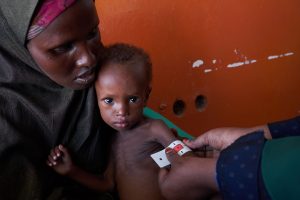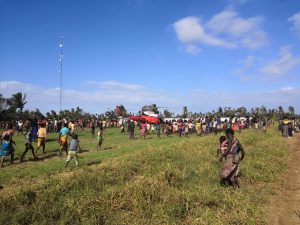

Your browser is not up to date.
If you wish to view the Action Against Hunger website correctly, update your browser.
Find the latest versions of supported browsers listed below.
No matching results…
No results seem to match what you are looking for, please modify your search.
 © Guy Calaf pour Action contre la Faim
© Guy Calaf pour Action contre la Faim
Headline
For nearly 40 years we have led the global fight against hunger, doing everything in our power to build prosperous communities free from hunger.
The association was created in 1979 under the name International Action Against Hunger (IAAH). Founded by a movement of French intellectuals and doctors, our first mission took place in Pakistan to help Afghan refugees who had fled war in their country.
We aim to end life-threatening hunger for good by preventing, detecting and treating under-nutrition. Our work is essential before and after disasters such as conflicts or natural disasters strike. We want to alert on the forgotten crisis so that no one is left behind.


40 years after our organization was created, our fight against hunger, its causes and consequences are ongoing. Our actions among vulnerable populations continues, particularly in war zones and crisis areas such as Yemen or the Lake Chad basin. We are also active in regions particularly affected by climate change such as Sahel or the Horn of Africa. We accompany Rohingya refugees in Bangladesh and fight epidemics such as the Ebola virus crisis in the Democratic Republic of Congo.
Over the years, we strive to help the people we accompany as best as we can, adapting to the situation they are going through. We have a strong experience answering to emergency situations. Natural disasters, conflicts, poverty depending on the context, a humanitarian crisis can trigger massive movements of people looking for a refuge or access to basic needs and services. During these situations we set up distributions of food and water. Following Cyclone Idai, which hit Mozambique and Zimbabwe last March, we distributed hygiene kits with jerry cans to collect water, water purification tablets, hygiene products for women and girls and cooking utensils.
In Mozambique, we worked with local actors such as the Kulima association to provide access to water. After a disaster of this magnitude, access to water is essential to avoid the spread of water-borne diseases. It was the case in Mozambique when 4000 cases of cholera broke out shortly after the cyclone hit.


Our action is not only focused on emergencies responses, we are also there to promote and impulse a resilient response among the population after the disaster. We put in place food security and livelihood programmes that create work opportunities, boost the economy, support women’s empowerment and help the people we enable people to provide for themselves and their families in the long run.
In Iraq, one of our programmes linked apprentices with entrepreneurs -women and men- so that young apprentices could learn the profession of their choice. We also provided the necessary tools for refugees and host communities to restart their businesses. Yassir is Syrian, before the conflict he was a pastry chef for nearly ten years. When the war broke out, he had to flee and leave everything behind. We provided him with funds and equipment so that he could start over his business in Iraq where he settled with his family.
In Nigeria, we organise cash distributions for women to promote their empowerment. Women manage their budget as they want and according to their family needs or their own. Cash distributions prevent people from being dependent on our food distributions, to provide for themselves and chose what they want to buy according to their specific needs or habits.
Our Mental Health and Care Practices expertise helps the people we support to start over traumatic events they might have witnessed. We rely on researches that show that during conflicts, many mothers who had had to flee were no longer able to breastfeed. As a result of the psychological trauma they’ve suffered, they could no longer produced milk, putting the health of the child at risk. We provide psychological support to help mothers, children and adults moving forward.
We conduct awareness-raising sessions on good care practices in most of our countries of intervention. Mothers often lack information on good practices and do not always have access to regular medical follow-up. Thanks to these sessions and our workshops, they can share their difficulties, their doubts, and feel surrounded by mothers in the same situation while creating a strong bond from mother to child.







We take action in nearly 50 countries around the world, with as many different cultures, languages, dialects and customs, making access to missions and effective intervention more difficult. Our willingness to hire and train local people to the many professions needed to help us fight hunger and is part of an efficient approach. Therefore, our humanitarian aid workers know the language and culture of the country and the people they accompany which enables them to have a relationship based on trust.
Over the past 40 years, humanitarian aid has evolved considerably. At the beginning it essentially focused on an emergency response by providing sacks of rice bags and non-perishable food to the population. Nowadays, food distributions are only carried out to respond to basic needs during emergency situations such as natural disasters and when a massive displacement of population is at stake. Development aid is a priority, our goal is to train populations or health workers when necessary so that they have the tools to fight hunger by themselves.
To do this, we train volunteers to become community health workers and transmit the knowledge we have about undernutrition to the most remote areas so that everyone has access to health care. They are in charge of traveling in their region and going to the most remote communities to screen people for malnutrition. Like Hawa in Mali, she is an influential member of her community, so we have trained her to screen for undernutrition so that she can pass her knowledge on to her community and reduce hunger. When we have to screen people in the region, they have to trust us, a mother will be more wary of entrusting her child to someone from elsewhere who doesn’t speak the same language. This is why the role of our aid workers is essential in this screening and awareness-raising phase.
More than 7800 people work to fight hunger and 95% of our humanitarians on the field were born in the country they work in. In many countries such as Guatemala, Nigeria or Chad, we set up health centres in remote areas to provide access to healthcare everywhere and for everyone.
In 40 years, the association has extended its action, made it evolve to adapt to the needs of the people we accompany. We are developing many projects to fight against the consequences of climate change, which is directly linked to the capacity of populations to feed themselves and therefore to hunger. Our programs provide sustainable aid to communities, giving them the tools and knowledge to be autonomous, to boost economies and to support these women and men who have decided to undertake, to create their own activity.
In 2018, we have been able to support more than 21 million people and lift them out of hunger; thanks to the people who struggle every day, thanks to the people we support and work with, and thanks to our donors.
All the news of our Action: articles, events, testimonials, press releases…